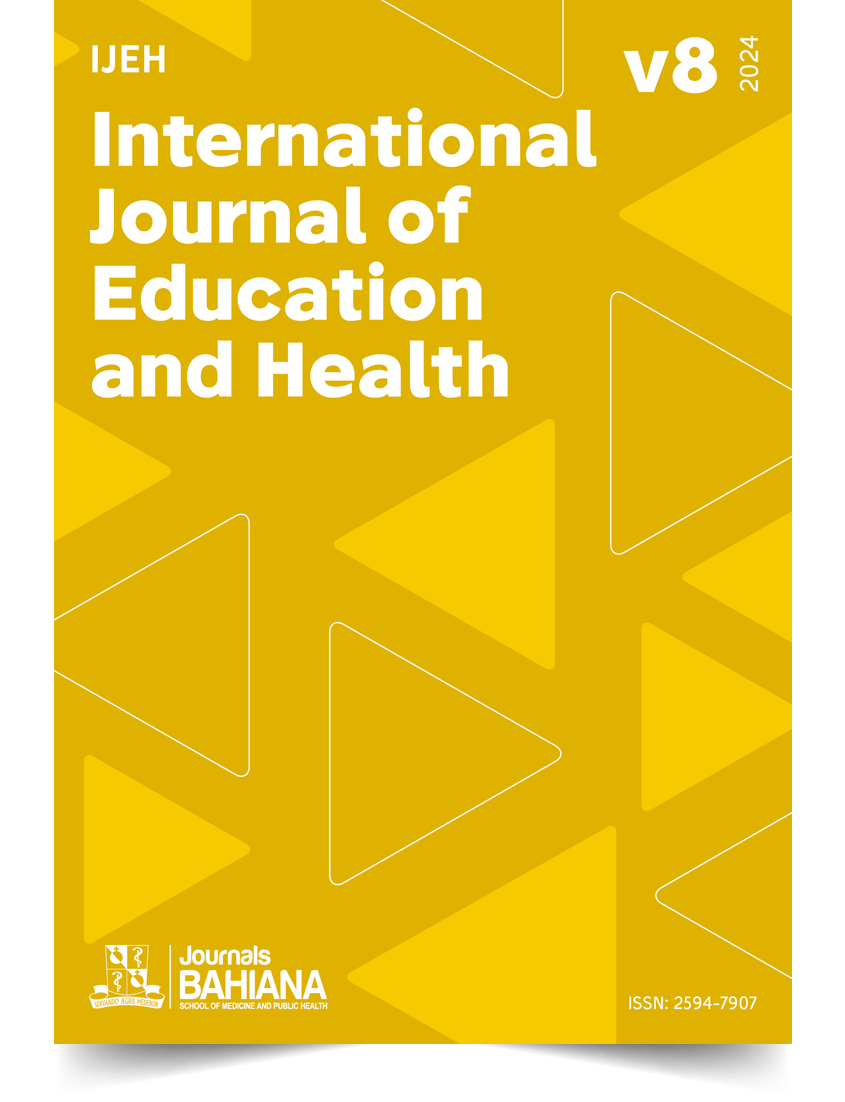Competency-based education as a framework for the systematization of academic monitors instruction
DOI:
https://doi.org/10.17267/2594-7907ijeh.2024.e5443Keywords:
Competency-Based Education, Medical Education, MentoringAbstract
INTRODUCTION: The monitor is an agent of the teaching-learning process in higher education in Brazil. Teaching monitoring programs can impact the monitor's learning, the learning of the students monitored, and the quality of teaching practice. However, there are few publications on this subject, and more evidence is needed to indicate the best methods for monitoring programs to reach their potential. OBJECTIVES: To report the experience of planning and developing a systematization of the instruction of academic monitors using the principles of competency-based medical education as a framework. EXPERIENCE REPORT: The monitor's instruction was structured in three steps: 1) Identification and definition of the desired competencies; 2) Selection of activities and methodologies; 3) Evaluation. For the first step, the authors listed technical-professional competencies and competencies for the 21st century. For step 2, active participation and peer collaboration were prioritized. For step 3, moments of active listening were planned and carried out, prioritizing metacognition and self-regulation. FINAL CONSIDERATIONS: The systematization of a competency-based instructional path can facilitate the acquisition of knowledge, abilities, and attitudes by the academic monitor and, consequently, benefit the entire structure of higher education. Future investigative studies are needed to assess the extent of this impact.
Downloads
References
(1) Presidência da República (Brasil). Lei nº 9.394, de 20 de dezembro de 1996. Estabelece as diretrizes e bases da educação nacional. [Internet]. Diário Oficial da União. 1996 dez. 23. Available from: https://www.planalto.gov.br/ccivil_03/leis/L9394compilado.htm
(2) Nascimento JT, Cardoso LTS, Araújo LCN, Oliveira VVN, Silva ES, Silva PJTG, et al Monitorship as a teaching initiation space. REAS. 2021;13(2):e5577. http://dx.doi.org/10.25248/reas.e5577.2021
(3) Abreu TO, Spindola T, Pimentel MRAR, Xavier ML, Clos AC, Barros AS. Academic monitoring in the perception of undergraduate nursing students. Rev Enferm UERJ [Internet]. 2014;22(4):507-12. Available from: https://www.e-publicacoes.uerj.br/enfermagemuerj/article/view/15368
(4) Frison LMB. Monitorship: a teaching modality that enhances collaborative and self-regulated learning. Pro-Posições. 2016;27(1):133-53. http://dx.doi.org/10.1590/0103-7307201607908
(5) Vicenzi CB, Conto F, Flores ME, Rovani G, Ferraz SCC, Marostega MG. The role of the monitor in the process of academic training. Rev Ciênc Ext [Internet]. 2016;12(3):88-94. Available from: https://ojs.unesp.br/index.php/revista_proex/article/view/1257
(6) Silveira E, Sales F. The Importance of Monitoring Program in teaching Librarianship from the Universidade do Estado de Santa Catarina (UDESC). InCID: Rev Ci Inf Doc. 2016;7(1):131-49. http://dx.doi.org/10.11606/issn.2178-2075.v7i1p131-149
(7) Natário EG, Santos AAA. Monitor program for university education. Estud Psicol. 2010;27(3):355-64. http://dx.doi.org/10.1590/S0103-166X2010000300007
(8) Frank JR, Snell LS, Cate OT, Holmboe ES, Carraccio C, Swing SR, et al. Competency-based medical education: theory to practice. Med Teach. 2010;32(8):638-45. https://doi.org/10.3109/0142159x.2010.501190
(9) Organização das Nações Unidas para a Educação, a Ciência a Cultura. Educação: um tesouro a descobrir: Relatório para a UNESCO da Comissão Internacional sobre Educação para o Século XXI [Internet]. Brasília: UNESCO; 2010. 41 p. Available from: https://unesdoc.unesco.org/ark:/48223/pf0000109590_por
(10) Resolução CNE/CES nº 3, de 20 de junho de 2014 (Brasil). Institui Diretrizes Curriculares Nacionais do Curso de Graduação em Medicina e dá outras providências. [Internet]. Diário Oficial da União. 2014 jun. 23. Available from: https://normativasconselhos.mec.gov.br/normativa/view/CNE_RES_CNECESN32014.pdf?query=classificacao
(11) Organização das Nações Unidas para a Educação, a Ciência a Cultura. Educação para a cidadania global: preparando alunos para os desafios do século XXI [Internet]. Brasília: UNESCO; 2015. 44 p. Available from: https://unesdoc.unesco.org/ark:/48223/pf0000234311
(12) Partnership for 21st Century Learning. P21 Framework Definitions [Internet]. 2009. Available from: https://files.eric.ed.gov/fulltext/ED519462.pdf
(13) Battelle for Kids, Partnership for 21st Century Learning. Framework for 21st Century Learning Definitions [Internet]. 2019. Available from: https://static.battelleforkids.org/documents/p21/P21_Framework_DefinitionsBFK.pdf
(14) Bakay ME. 21st Century Skills for Higher Education Students in EU Countries: Perception of Academicians and HR Managers. Int Educ Stud. 2022;15(2):14-24. http://dx.doi.org/10.5539/ies.v15n2p14
(15) Sá MJ, Serpa S. Higher Education as a Promoter of Soft Skills in a Sustainable Society 5.0. Journal of Curriculum and Teaching. 2022;11(4). http://dx.doi.org/10.5430/jct.v11n4p1
Supplementary References
(SR1) Aronson E. Building Empathy, Compassion, and Achievement in the Jigsaw Classroom. In: Aronson J, editor. Improving Academic Achievement. Impact of Psychological Factors on Education. Elsevier; 2002. p. 209-25. https://doi.org/10.1016/B978-012064455-1/50013-0
(SR2) Rasmussen A, Lewis M, White J. The application of wiki technology in medical education. Med Teach. 2013;35(2):109-14. https://doi.org/10.3109/0142159x.2012.733838
(SR3) Osman M, Eacott B, Willson S. Arts-based interventions in healthcare education. Med Humanit. 2018;44(1):28-33. https://doi.org/10.1136/medhum-2017-011233
(SR4) Belay HT, Ruairc BO, Guérandel A. Workshops: An important element in medical education. BJPsych Advances. 2019;25(1):7-13. https://doi.org/10.1192/bja.2018.41
(SR5) Zeng HL, Chen DX, Li Q, Wang XY. Effects of seminar teaching method versus lecture-based learning in medical education: A meta-analysis of randomized controlled trials. Med Teach. 2020;42(12):1343-49. https://doi.org/10.1080/0142159x.2020.1805100
(SR6) Crouch CH, Mazur E. Peer Instruction: Ten years of experience and results. Am J Phys. 2001;69(9):970-7. https://doi.org/10.1119/1.1374249
(SR7) Cate O, Durning S. Peer teaching in medical education: twelve reasons to move from theory to practice. Med Teach. 2007;29(6):591-9. https://doi.org/10.1080/01421590701606799
(SR8) Berrett D. How 'flipping' the classroom can improve the traditional lecture [Internet]. The Chronicle of Higher Education. 2012 feb. 19. Available from: https://commons.marymount.edu/instructingonline/wp-content/uploads/sites/135/2013/07/Flipping-The-Chronicle.pdf
(SR9) Chowdhury TA, Khan H, Druce MR, Drake WM, Rajakariar R, Thuraisingham R, et al. Flipped learning: Turning medical education upside down. Future Healthc J. 2019;6(3):192-5. https://doi.org/10.7861/fhj.2018-0017
(SR10) Graafland M, Schraagen JM, Schijven MP. Systematic review of serious games for medical education and surgical skills training. Br J Surg. 2012;99(10):1322-30. https://doi.org/10.1002/bjs.8819
(SR11) Gorbanev I, Agudelo-Londoño S, González RA, Cortes A, Pomares A, Delgadillo V, et al. A systematic review of serious games in medical education: quality of evidence and pedagogical strategy. Med Educ Online. 2018;23(1):1438718. https://doi.org/10.1080/10872981.2018.1438718
(SR12) Ismail MAA, Mohammad JAM. Kahoot: A promising tool for formative assessment in medical education. Educ Med J. 2017;9(2):19-26. https://doi.org/10.21315/eimj2017.9.2.2
(SR13) Kokotsaki D, Menzies V, Wiggins A. Project-based learning: A review of the literature. Improv Sch. 2016;19(3):267-77. https://doi.org/10.1177/1365480216659733
(SR14) Chen CH, Yang YC. Revisiting the effects of project-based learning on student’s academic achievement: A meta-analysis investigating moderators. Educ Res Rev. 2019;26:71-81. https://doi.org/10.1016/j.edurev.2018.11.001
Downloads
Published
Issue
Section
License
Copyright (c) 2024 Livia Souza Pugliese, Adriana Pedrosa Moura

This work is licensed under a Creative Commons Attribution 4.0 International License.
This work is licensed under a Creative Commons Attribution 4.0 International License.



